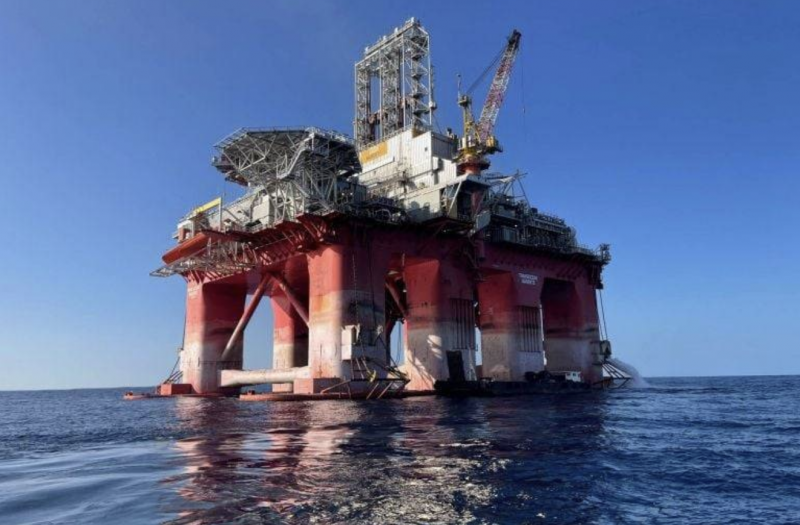
This undated photo provided by French giant TotalEnergies on Aug. 16, 2023 shows the Transocean Barents drilling rig, which arrived in Lebanese territorial waters in search of offshore gas. (Credit: AFP/TotalEnergies)
The consortium made up of TotalEnergies, Italy's Eni and QatarEnergy failed to sign contracts for the exploration and exploitation of blocks 8 and 10 of Lebanon's Exclusive Economic Zone (EEZ) on time. They did not request an extension, probably due to their refusal of certain conditions set by the Lebanese state.
This refusal again puts the two blocks at stake in a third call for tenders, outgoing Minister of Energy Walid Fayad told L'Orient-Le Jour.
This new twist once more slows down the allocation of licenses for the remaining blocks in the EEZ, after the second round of bidding has been postponed several times since its launch in 2019. This was due to a lack of candidates and against a backdrop of a multidimensional crisis in Lebanon.
The deadline for the three companies to sign the two contracts, one for each block on the border with Israeli waters at the southernmost tip of the EEZ, expired on Saturday. But "the consortium has not come forward, either orally or in writing, to request an extension," which can be granted by a decision of the cabinet.
Seismic studies
At the beginning of October, TotalEnergies, Eni and QatarEnergy submitted two bids for blocks 8 and 10 of the EEZ, following several unsuccessful bids for the second licensing round for the two zones.
These proposals were studied by the Lebanese Petroleum Association (LPA), which submitted adjustments to Fayad. The complete file was then submitted to a cabinet meeting in mid-January.
Having refrained from signing the contracts, it appears that the three companies refused "two of the conditions set" by the Lebanese state and validated in the version of the contracts approved by the cabinet, according to Fayad.
"The first concerns the period during which, if the contract is signed, the consortium can decide whether or not to carry out the 3-D seismic studies for block 8, an operation that costs between 10 and 15 million dollars," explained the minister.
"The consortium had asked for one year" to carry out this operation, to await the detailed results of the drilling of block 9, but Lebanon felt that three months was sufficient, given that these results were expected in March.
The seismic survey was not previously launched due to the unrest linked to the war in Gaza.
The 3D seismic survey is a ground imaging technique that gives oil companies a better reading of the hydrocarbon potential of the areas studied, thereby limiting the risk of drilling operations that would not lead to any discoveries.
As the deployment of a drilling rig requires heavy investment and costs, companies carrying out this type of study sell their results at a high price to companies interested in acquiring the right to prospect in a given territory.
3D seismic imaging is carried out after another type of study, in 2D, which is akin to an initial ultrasound scan of the subsurface, using another technology.
Time limit
The state's second condition, which according to Fayad was not accepted by the consortium, concerns "the period during which the consortium can decide whether or not to drill an exploration well."
"Lebanon had set a time limit of one year, as stipulated in the conditions laid down in the framework decrees, but the consortium wanted to extend it to two years. We finally proposed a year and a half, but the consortium doesn't seem to have accepted it," he said.
According to Fayad, this refusal was not due to a "disagreement over financial conditions, or the national preference that Lebanon requested for hiring." These conditions included a minimum 80 percent "Lebanese recruitment" requirement for companies holding exploration and production licenses.
Blocks 8 and 10 are now officially back in the running, as part of the third licensing round, which was validated in January by the cabinet and concerns all the remaining blocks in the EEZ. The deadline for bids is July 2, 2024.
The process of awarding exploration and exploitation licenses for the Lebanese EEZ was launched in 2017. In 2018, the TotalEnergies/Eni/Novatek consortium won the first licenses for blocks 4 and 9. Exploration of block 4 (located off the coast of Batroun, North Lebanon) was carried out in 2020 and failed to detect an exploitable deposit.
In October 2023, the consortium eventually surrendered its license for this block and did not continue operations there. The exploration process for block 9 of the EEZ was delayed for several years, and it wasn't until Lebanon and Israel signed a historic agreement in October of 2022, finally demarcating their maritime border, that the process was restarted. Launched the following year, offshore gas exploration drilling in block 9 failed to find any traces of gas.
It seems easier for Lebanon to try to renegotiate the terms of the contract for blocks 8 and 10 with the consortium, rather than reintegrating them into the third award round, the success of which is not guaranteed given the numerous obstacles encountered in recent years. Should the cabinet consider debating this issue when the consortium has not come forward before the end of the deadline to sign the contracts?
This article was originally published in L'Orient-Le Jour.